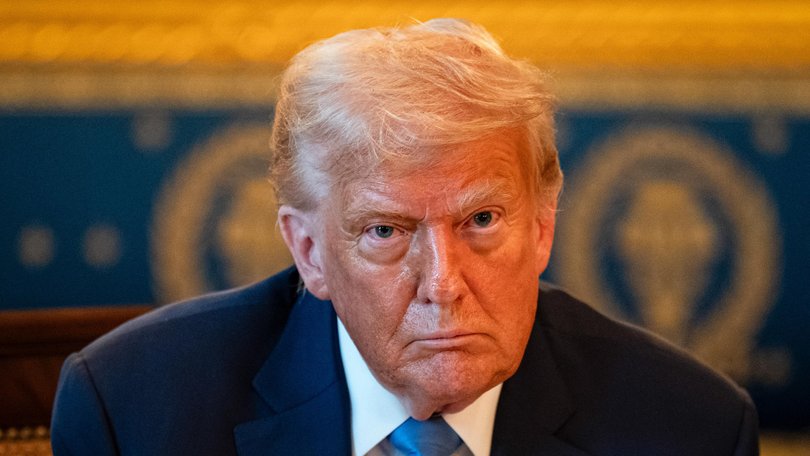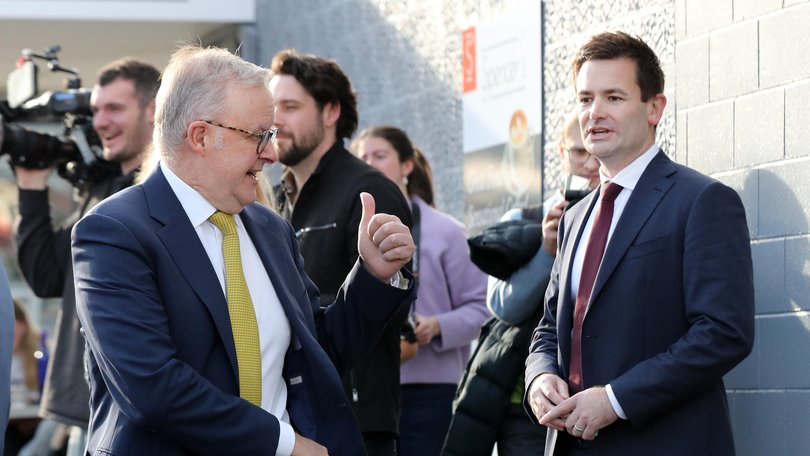Albanese vows he won’t give up on tariff negotiation as Trump’s first letters sent out
Anthony Albanese says his Government will keep trying to convince Donald Trump not to hit Australia with tariffs, as the US President forges ahead with his isolationist trade agenda.

Anthony Albanese says his Government will keep trying to convince Donald Trump not to hit Australia with tariffs, as the US President forges ahead with his isolationist trade agenda.
The US President on Monday wrote to leaders of a number of Asian countries, including allies Japan and South Korea as well as Serbia, Bosnia and Herzegovina, South Africa, and Tunisia, of tariffs of at least 25 per cent unless deals are brokered before his new deadline of August 1.
“The president’s phone, I can tell you, rings off the hook from world leaders all the time, who are begging him to come to a deal,” White House spokeswoman Karoline Leavitt said on Monday.
Sign up to The Nightly's newsletters.
Get the first look at the digital newspaper, curated daily stories and breaking headlines delivered to your inbox.
By continuing you agree to our Terms and Privacy Policy.“And this administration is working hard to ensure those deals are in the best interest of the American people, and this delay, again, is in the best interest of the American people.”
More countries’ rates and Mr Trump’s letters to their leaders will be published in coming days, the White House said.
The “reciprocal tariffs” will now take effect from August 1 — an extension from the already delayed July 9 start.
Australia is subject to a 10 per cent “baseline tariff”, the minimum rate Mr Trump has imposed on all US trading partners which was not paused.
The Prime Minister said he was not giving up on trying to get that impost removed, but that “no country has a better deal than Australia”.
“We’ll continue to put our case that tariffs are an act of economic self-harm and that we should be entitled to reciprocal tariffs, which is zero,” he said.

“We’ll continue to put that case. But the US administration has a view that they’re engaged with other countries on as well.
“It varies, the tariff, from country to country. But no country has secured an exemption from the US administration.”
Government sources say there is some quiet acceptance that there may not ever be a better deal than the 10 per cent base line.
Nevertheless, the Prime Minister was due to make his case to Mr Trump on the sidelines of the G7 summit in Canada last month, but the meeting was cancelled when the President returned to Washington to deal with the Israel-Iran war.
The pair have yet to reschedule, but Mr Albanese has pointed to the upcoming “summit season” as offering multiple opportunities for the pair to meet.
The Opposition have demanded the Prime Minister be more proactive.
“It’s very difficult for the Australian Government to negotiate anything if the Prime Minister Anthony Albanese can’t be in the room and get a meeting with Donald Trump,” Opposition Leader Sussan Ley said on Tuesday.
“So unfortunately, 245 days after the President became the President, we still don’t see that meeting, and we don’t have it scheduled. And what that underlines is that whenever there’s any discussions about tariffs, we unfortunately are not there, able to plead our case.
“I would urge that the Prime Minister do everything possible to achieve that meeting, to build that relationship.”
Meanwhile, a new report from the Productivity Commission released overnight found the disruption from Mr Trump’s tariffs could have a “small, positive effect” on the Australian economy.
The modelling found that impact could come as goods previously sold to the US would be diverted to us at a cheaper rate, and Australia would also benefit from investment flowing out of America and countries with hefty tariffs.
The 0.4 per cent lift in GDP does not account for other, harder to model knock-on effects.
Treasurer Jim Chalmers on Tuesday said the modelling further showed Australia was “well placed, better placed and better prepared than most countries to deal with the uncertainty that comes from these tariff decisions” he said.
“Partly because we have the lowest rate, but also because we’ve got a lot of advantages in a world where people are looking for new places to invest or they’re looking for more reliable, more robust supply chains,” he said.
“The PC report really goes to that, that these tariffs are a bad development for the global economy and for Australia, but there’s opportunity in that for us as well.”
The commission also warned against retaliating with our own tariffs, recommending the best response would be to boost the productive potential of Australia’s economy at home.
Dr Chalmers said he believed that approach was “broadly the right one”.
“I think the from an Australian point of view, the last thing we should be doing is engaging in kind of tit-for-tat tariffs,” he said.

